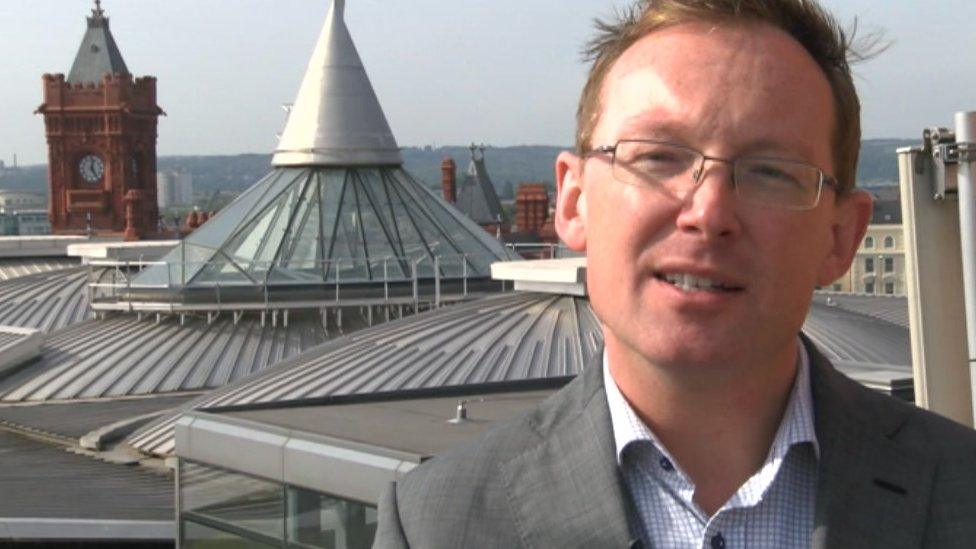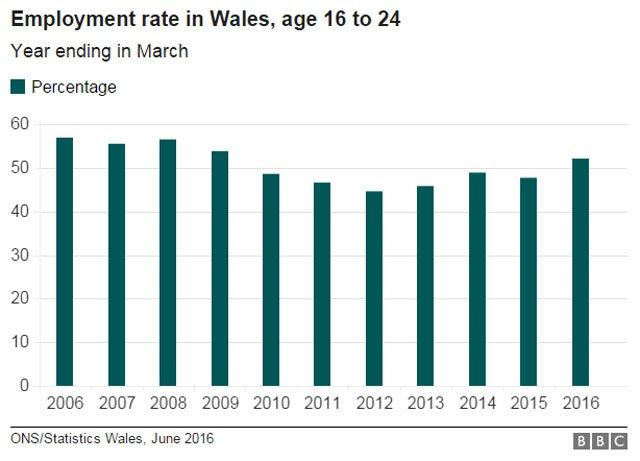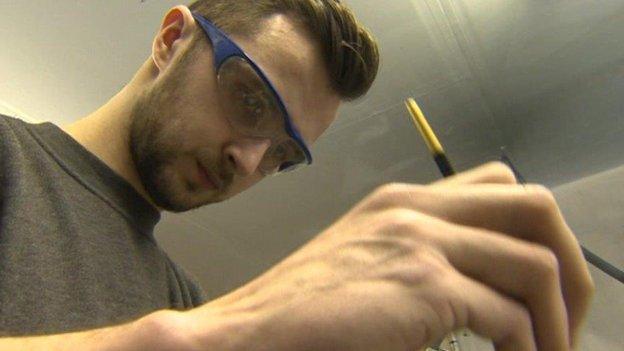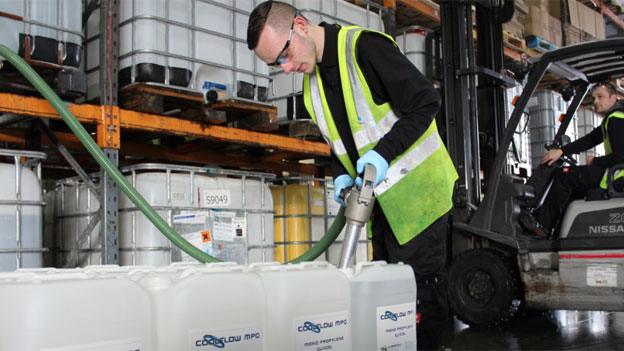Jobs Growth Wales youth employment scheme cut back
- Published
Ken Skates says market conditions have improved since Jobs Growth Wales was launched
A flagship youth job creation scheme run by the Welsh Government is cutting the support it offers to firms by half.
Jobs Growth Wales (JGW) used to offer 100% subsidy for firms to employ people aged between 16-24, but its website, external now says it is offering just half.
Economy Secretary Ken Skates said market conditions had improved, adding that a new scheme for all ages was being created.
Welsh Conservatives claimed the move made "no sense".
The scheme, which is part-funded with EU money, was launched in 2012 and helps cover the cost of the national minimum wage for an employee. Further funding of £25m was agreed for JGW last year.
'Pragmatic'
The change - which the JGW Facebook page, external suggests took effect on 1 August - follows a report in July which recommended ministers look at cutting the subsidy.
Mr Skates said: "We've seen remarkable economic improvements in Wales, so we've adjusted the programme accordingly to make sure there is still the growth in employment opportunities for young people.
"But we've also responded to market conditions which have improved since Jobs Growth Wales was first designed.
"So we have been pragmatic in our approach but what we are doing is creating… an all age employability programme that will give anybody who faces unemployment an opportunity to gain skilled employment."
A Welsh Government spokesman confirmed plans for a single support programme in place of JGW, ReAct and Traineeships "that will better meet the needs of those requiring support to gain, retain and progress within work".

Russell George: 'A profound change... which will undoubtedly affect take-up'
Tory economy spokesman Russell George said it was "appalling" that the Welsh Government decided to cut the subsidy to firms "without having the courtesy to inform the public or elected members".
He called the move a "profound change... which will undoubtedly affect take-up", adding: "One minute the economy is in grave danger because of Brexit, now we're told a 50% cut to their flagship job creation scheme is necessary because firms are doing too well."
"It makes no sense."
Plaid Cymru MP Jonathan Edwards said: "Jobs Growth Wales has been marred by flaws from the beginning - from cancellation to a confused relaunch to questionable success rates.
"This latest development, snuck out by Labour in their usual scrutiny-shy fashion, shows their ineptitude when it comes to forming and implementing an effective programme for tackling unemployment and helping Welsh businesses grow."

The employment rate for young people in Wales, for the 12 months ending in March, is 52.1% - the highest it has been since the same period in 2009, when it was 53.8%.
A director of one firm using JGW suggested the cut might lead to second thoughts.
"That would make a big impact in whether we would take someone on or not," said Robert Jones, of RJ Plant and Construction in Tredegar, Blaenau Gwent.
"This is the first I have heard of it," he added.
Mr Jones said the six months funding "gives everyone a open outlook", allowing firms time to decide whether the candidate was "suitable for us or whether they want to work for your company" or for the industry in question.

How Jobs Growth Wales works

Vacancies for Jobs Growth Wales are listed on the Careers Wales website
Firms or organisations can take part if the job they are looking to fill is for between 25 and 40 hours a week, and is contracted for a minimum of six months
The position to be funded has to be a new role, rather than something already advertised or to cover for sickness or maternity
Candidates need to be unemployed, aged between 16 and 24, living in Wales. They cannot have taken part in a JGW placement before
Applicants apply through the Careers Wales, external website.
Under the first JGW scheme, which ran from 2012 to April 2015, the Welsh Government said 14,989 job opportunities were filled, external.
A total of 1,311 jobs were filled up under the current programme, between its start in September 2015 and 10 June.
But a report for the Welsh Government published in July found the impacts of JGW were "primarily short term in nature".
The study said that 27 months after the initial application for a JGW vacancy there were "no statistically significant differences" between the employment rates of JGW participants and a matched comparison group.
It said that, given the "significant shift" in unemployment rates for young people, it "may be worth" ministers "reconsidering the level of investment needed", including reducing the subsidy offered to employees.

Analysis by Nick Servini, BBC Wales political editor

There have been some dire warnings about prospects for the British economy post-Brexit, but nevertheless the Welsh Government feels sufficiently confident about job-making prospects that it is halving the subsidy of its main support programme.
To be clear, there have been remarkably low rates of unemployment in Wales in recent months.
The latest figures show the rate has fallen to its lowest level in a decade, and is now consistently below the UK average.
The question is whether that job-creating ability will be affected by cutting a scheme which ministers in Cardiff Bay have turned into a central plank of economic development policy.
Jobs Growth Wales is not without its opponents. The main criticism is that public money is used to support jobs that were being created anyway.
It would appear that ministers are also now convinced that the private sector needs less support than it has in the past.
- Published13 May 2015

- Published10 April 2015

- Published3 June 2014
